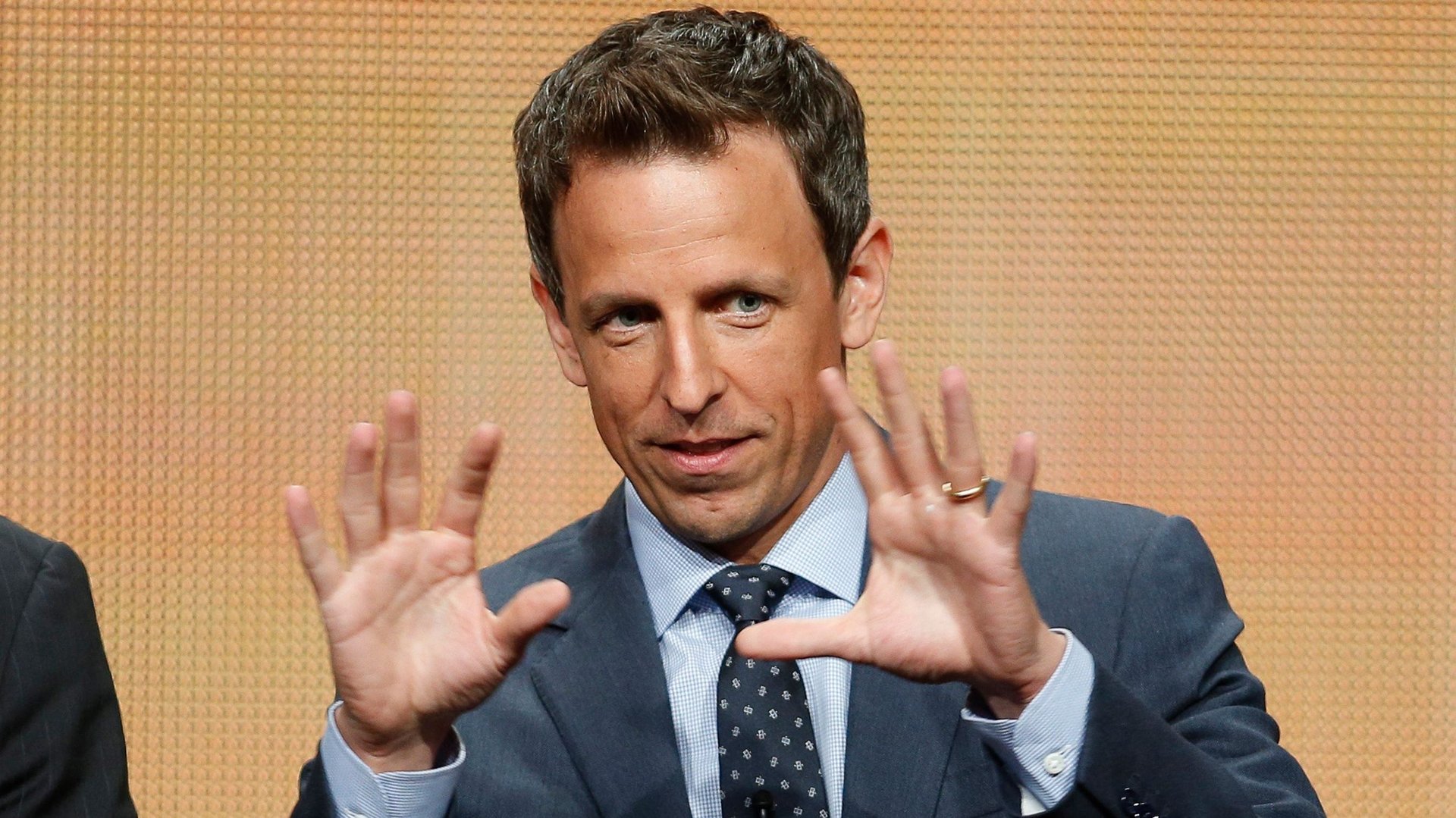Seth Meyers perfectly summarizes what parents need to do for “children” in their 20s
Comedian Seth Meyers ought to be pretty confident about his talent these days. He’s the host of his own late-night show, NBC’s Late Night with Seth Meyers, and his performance emceeing this year’s Golden Globes, the first major Hollywood awards night held after the fall of movie producer Harvey Weinstein, was praised as “almost perfect.”


Comedian Seth Meyers ought to be pretty confident about his talent these days. He’s the host of his own late-night show, NBC’s Late Night with Seth Meyers, and his performance emceeing this year’s Golden Globes, the first major Hollywood awards night held after the fall of movie producer Harvey Weinstein, was praised as “almost perfect.”
But Meyers, who may be best known as a long-time cast member of Saturday Night Live, once confessed that it took him some time to feel secure on that iconic show. In an episode of Comedians in Cars Getting Coffee, comedian Jerry Seinfeld’s Netflix series that is exactly what it sounds like, he said, “My first, like, four years on the show were rocky. Like, ‘Oh, I might be, of everyone here, the worst one at it. I might be the worst at impressions. I might be the worst at accents,’” Meyers says, recounting his internal monologue at the time. “Maybe I just don’t belong on this cast.”
In his third year, he recalls, his concerned father, whose expertise was in finance, approached him with some well-meaning advice: “I feel like what you need to really break out is, like, a couple more characters.”
By this point in the program, it’s been established that Meyers’ father, despite the finance job, nevertheless had some decent principles of comedy tips to offer his son over the years. Like, never repeat a joke in a conversation because you think no one heard it, “because there’s a chance everyone heard it and they didn’t like it the first time.” But this time, Meyers didn’t find his father’s advice very helpful.
His response is one that young adults with well-meaning parents might want to steal. He told Seinfeld:
“I remember saying to him, ‘You’ve done a very good job of being a tough, honest critic with me. I no longer need it. So you have to shift from what you’ve been doing to a completely different role…of support.’”
It’s a highly familiar moment, but it epitomizes a stage of child-parent relationships that actually gets way less attention than others. This era of so-called “emerging adulthood,” when children move away from home, finish college, but may or may not enter into a career right away, is what author Jane Isay once called “the second passage out.”
We’re now in the season when parents and their children are eyeing that passage. The boundaries are shifting and it’s unclear whether more or less advice about career moves or gym memberships or how to dress is, in fact, the right strategy. Isay’s 10-year-old book, Walking on Eggshells: Navigating the Delicate Relationship Between Adult Child and Parents (Anchor; 2008) can help. Grounded in interviews with 75 parents and their adult children, it was described by the New York Times as “quietly groundbreaking.”
The title itself, with a metaphor that you might sooner expect to see on a self-help guide to loving someone with Borderline Personality Disorder, is a good indication of how fraught this period can be.
“When their children become adults, many parents encounter a whole new world of anxiety, miscommunication, disappointment, and distance,” Isay writes in the book’s introduction. In candid interviews throughout, parents detail the mistakes they’ve made lending money, or not lending it, and the dependence or resentment that can follow. They talk about dealing with sibling rivalries, and the sometimes uneasy introduction of spouses into the family fold.
They also offer advice about advice itself, essentially saying what Meyers said: At some point, it has to stop.
Here, the best line comes from a 78-year-old woman in Rhode Island, Sheila, who has great relationships with all of her seven grown children, whom she was left to raise alone after her husband died. For their sustained bonds through adult problems, like alcoholism, she credits her personal rule: “Keep your mouth shut and your door open.”
Even as your adult children tell you about their anxieties, or when you see them obviously failing, the rule applies.
“She is accepting of her children and doesn’t take their flaws personally,” Isay writes. “She seems to have found a way to appreciate each of them as a person, and she has made a place in her heart for all their spouses, even the ones she doesn’t care for. Her heart breaks when they are in pain, and she makes herself available to them.”
Marvelously “serene” Sheila is not representative of most parents, Isay notes. Having no idea how to stop with the critiques is a common problem, one that can last a lifetime, even though judgment is what young adults find especially infuriating from their parents. “It is hard to let go. It’s hard to not want to keep giving advice,” says one mother who is clearly pestering her adult son with advice, “because I still think I could help him.”
When someone loses all sense of restraint, Isay urges at least padding advice in layers of indirectness: “Here are some ways to consider the problem….”; “This might sound silly, but…” ; “Have you considered…” ; “I had a friend who…”
Meyers, who appeared on SNL from 2001 to 2014, kept his amateur-humorist father, and the rest of his family, pretty close, it turns out. Both Larry and Hilary Meyers and brother Josh occasionally appear in a segment called The Meyers Family on his late-night show, and they’re all pretty funny.